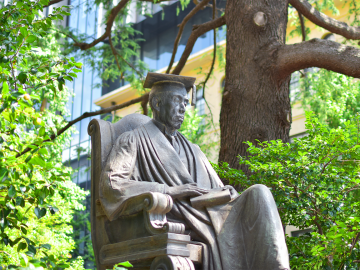Act on Promotion of Gender Equality in the Political Field
(Act No. 28 of May 23, 2018)
Satoshi KOTAKE,
Lecturer, Faculty of Law, Waseda University,
Professor of Law, Faculty of Political Science and Economics, Takushoku University
I. Background
There is little gender equality in politics in Japan. In the national Diet, just 47 women hold seats in the House of Representatives (10.1 percent of the 465 seats) and women hold 50 of the 242 seats (20.7 percent) in the House of Councilors. According to the Inter-Parliamentary Union, as of November 1, 2018, the average shares of seats held by women in each House of the national parliaments of its member countries is about 24.0 percent each. In the lower House, Japan ranks 160 among the 193 members. Women’s participation at Japan’s municipal level also is much lower, and it seems obvious that Japan’s gender equality in politics has lagged behind that of other countries for a long time.
In 2003, recognizing this disparity, the Headquarters for the Promotion of Gender Equality, established by the Cabinet in July 1994, determined to increase the share of women in leadership positions to at least 30 percent by 2020 in all aspects of society. In 2015, the cabinet approved the Fourth Basic Plan for Gender Equality, which states that it is essential in democratic societies that men and women share responsibility through active participation in political decision-making processes so that political and social policymaking and planning will fairly and impartially reflect diverse opinions and men and women will enjoy equal benefits.
In this context, a supra-partisan parliamentary group was established in 2015 to promote women’s participation and engagement in politics particularly for elected officials. Although the group initially studied and discussed the possibility of introducing a quota system, it changed direction after recognizing a need for further investigation and the difficulty of accommodating the differences among political parties regarding reforms to the electoral system and ways to impose legal obligations on political parties and other political organizations. Two distinct bills were introduced to the Diet in 2016, and agreement was reached after lengthy complex negotiations. Ultimately, the Act on Promotion of Gender Equality in the Political Field was unanimously passed in May 2018.
II. Summary of the Act on Promotion of Gender Equality in the Political Field
The Act on Promotion of Gender Equality in the Political Field (hereinafter, the Act) is summarized as follows.
First, Article 1 states the purpose of the Act as follows: The Act aims to effectively and positively promote gender equality in the political field and thereby to contribute to the development of democratic politics in which men and women jointly participate.
Second, Article 2 explains the Act’s fundamental principles as follows: The promotion of gender equality in the political field:
(1) is to be undertaken to achieve numbers of male and female candidates as equal as possible in elections of members of the House of Representatives, House of Councilors, and in the assemblies of municipal governments while securing freedom of political activity for political parties and other political organizations;
(2) must be conducted to ensure that men and women can fully express their individuality and ability regardless of gender; and
(3) must be conducted to make it possible for men and women to realize smooth and continuous balance of activities, such as the demands of elected public office and family responsibility through mutual cooperation and with social support, regardless of gender.
Third, Article 3 sets forth the responsibilities of the state and municipal governments, and Article 4 mandates the efforts of political parties and other political organizations. Article 3 provides that the state and municipal governments must endeavor to formulate necessary policies to promote gender equality in politics and to implement those policies while securing freedom of political activity of the political parties and other political organizations and of the fairness of elections. Article 4 provides that political parties and other political organizations must endeavor to voluntarily work to promote gender equality in politics, including setting goals for the numbers of male and female candidates for public office who are members of political parties or other political organizations.
Fourth, the Act has four provisions on fundamental policy matters: Research on Actual Situation and Collection of Information (Article 5), Enlightenment Activity (Article 6), Development of Environment (Article 7), and Development of Human Resources (Article 8).
Fifth, Article 9 states the legislative measures as follows. Based on the results of research on the actual situation and collection of information and so on, the state, when it deems it necessary, must take legislative, financial, and other actions necessary to promote gender equality in politics.
Sixth, this Act is in effect as of the date of promulgation, May 23, 2018.
III. Future Tasks
The Act establishes the fundamental principles on the promotion of gender equality in politics, but it imposes no legal obligations on political parties or other political organizations to increase their numbers of women members or candidates for public office. As prescribed by Article 4, political parties or other political organizations are only obligated to make voluntary efforts to tackle the problem of promoting gender equality in politics. The reason that women’s participation in political life is very low in Japan might relate to numerous cultural factors, such as gender stereotypes that persist in society or low general interest in participating in politics. Thus, it is very important that Japan ensure women’s abilities to increase their active participation in politics so that a diversity of perspectives will be heard. Continuous efforts are needed to this end, and it is particularly essential for us to monitor and pressure political parties and other political organizations regarding adoption and implementation of concrete measures to promote gender equality in politics.
January 15, 2019




